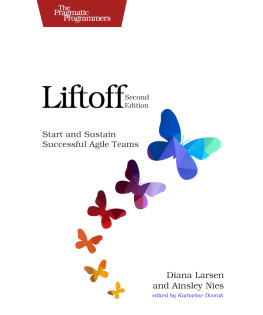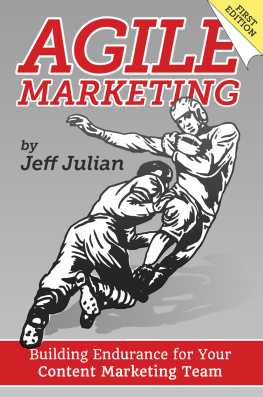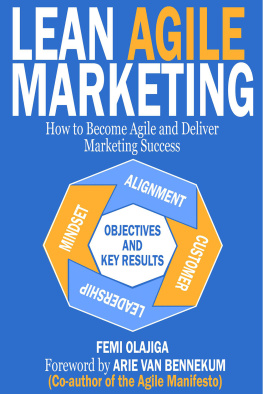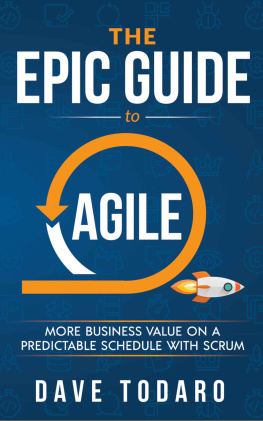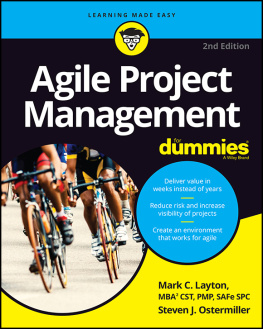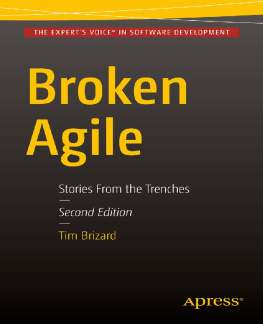Liftoff, Second Edition
Start and Sustain Successful Agile Teams
by Diana Larsen, Ainsley Nies
Version: P1.0 (June 2016)
Copyright 2016 The Pragmatic Programmers, LLC. This book is licensed to the individual who purchased it. We don't copy-protect it because that would limit your ability to use it for your own purposes. Please don't break this trustyou can use this across all of your devices but please do not share this copy with other members of your team, with friends, or via file sharing services. Thanks.
Many of the designations used by manufacturers and sellers to distinguish their products are claimed as trademarks. Where those designations appear in this book, and The Pragmatic Programmers, LLC was aware of a trademark claim, the designations have been printed in initial capital letters or in all capitals. The Pragmatic Starter Kit, The Pragmatic Programmer, Pragmatic Programming, Pragmatic Bookshelf and the linking g device are trademarks of The Pragmatic Programmers, LLC.
Every precaution was taken in the preparation of this book. However, the publisher assumes no responsibility for errors or omissions, or for damages that may result from the use of information (including program listings) contained herein.
About the Pragmatic Bookshelf
The Pragmatic Bookshelf is an agile publishing company. Were here because we want to improve the lives of developers. We do this by creating timely, practical titles, written by programmers for programmers.
Our Pragmatic courses, workshops, and other products can help you and your team create better software and have more fun. For more information, as well as the latest Pragmatic titles, please visit us at http://pragprog.com.
Our ebooks do not contain any Digital Restrictions Management, and have always been DRM-free. We pioneered the beta book concept, where you can purchase and read a book while its still being written, and provide feedback to the author to help make a better book for everyone. Free resources for all purchasers include source code downloads (if applicable), errata and discussion forums, all available on the book's home page at pragprog.com. Were here to make your life easier.
New Book Announcements
Want to keep up on our latest titles and announcements, and occasional special offers? Just create an account on pragprog.com (an email address and a password is all it takes) and select the checkbox to receive newsletters. You can also follow us on twitter as @pragprog.
About Ebook Formats
If you buy directly from pragprog.com, you get ebooks in all available formats for one price. You can synch your ebooks amongst all your devices (including iPhone/iPad, Android, laptops, etc.) via Dropbox. You get free updates for the life of the edition. And, of course, you can always come back and re-download your books when needed. Ebooks bought from the Amazon Kindle store are subject to Amazon's polices. Limitations in Amazon's file format may cause ebooks to display differently on different devices. For more information, please see our FAQ at pragprog.com/frequently-asked-questions/ebooks. To learn more about this book and access the free resources, go to https://pragprog.com/book/liftoff, the book's homepage.
Thanks for your continued support,
Dave Thomas and Andy Hunt
The Pragmatic Programmers
The team that produced this book includes: Katharine Dvorak (editor) Potomac Indexing, LLC (indexer) Eileen Cohen (copyeditor) Gilson Graphics (layout) Janet Furlow (producer)
For customer support, please contact .
For international rights, please contact .
Table of Contents
Copyright 2016, The Pragmatic Bookshelf.
Early praise for Liftoff: Start and Sustain Successful Agile Teams
High-performing teams are born in an environment where they are supported from inception. Liftoff: Start and Sustain Successful Agile Teams provides excellent techniques complemented by insightful stories that illustrate how you can help your teams execute with purpose throughout the project. This is an essential guide for coaches, project managers, and facilitators.
| Jorgen Hesselberg |
| Director, Intel Corporation |
This book is very hands-on, providing practical advice that motivates a team to start lifting off right away! A must read for everyone starting a project or productno matter if the approach will be agile or not.
| Jutta Eckstein |
| Author of Retrospectives for Organizational Change: An Agile Approach |
You may think that by now we know the importance of setting up new teams for success, but not everyone knows exactly how to go about it, and even fewer know how to do it in the incredible ways described in this book. We have all seen this done badly, rushed, or missed completely, but this book removes any excuses by giving the reader absolutely everything they will need. If you are starting a new team or you want to kick-start an existing team, this is the place to start your liftoff.
| David Mole |
| Agile coach and coauthor of Creating Great Teams: How Self-Selection Lets People Excel |
Foreword
My first introduction to the importance of liftoffs was in 2010. Diana Larsen and I were designing a training course on cross-functional agile, and she wanted to include a segment on team formation. As always, we had more material than time, so including her fluffy team-formation stuff meant cutting out some of my far more importantcontinuous-integration material.
But I agreed, and Im glad I did. Diana used a simple and fast technique for starting team formation that Ive shamelessly stolen and used ever since. The technique was to share one thing about yourself that people dont learn until theyve known you for a while.
More important, Diana sprinkled aspects of her and Ainsleys liftoff expertise throughout the course. Her lectures and activities about purpose, alignment, context, and the dynamics of team formation helped set the stage for real teamwork and success in those workshops. One attendee commented, I ended up on a development team that, in some ways, is more functional than my development team at work. Seriously, I could take this team back and start solving some real problems very, very soon.
When Ainsley and Diana came out with their first edition of Liftoff in 2012, I eagerly snagged a copy and started using the material with my teams. Ive seen it work over and over again. Now, with this revised and updated edition, Diana and Ainsley have set the standard for a second time. Ive already been fortunate to use the new edition to help launch over forty teams. Its concise, chock-full of useful examples, and most important, it works.
So much of team success is based on how well team members understand their context, their work, and one another. Every team needs a liftoff. This book shows the way.
James Shore
Coauthor of The Art of Agile Development
Copyright 2016, The Pragmatic Bookshelf.
Acknowledgments
In 2011, we acknowledged the help and support we received from family, friends, colleagues, and contributors as we took the journey from envisioning the idea of a book on liftoffs to launching it. Now, in 2016, we are doubly grateful once again for that same encouragement in word and actions for our second edition of Liftoff .
Our continued gratitude goes to III; Sharon Buckmaster; Agile Fluency Project organizers (James Shore, Adam Light, Steve Holyer, and Bonnie Aumann); and our friends and families whose patience with disrupted lives, projects, and schedules demonstrated their continuing support; as well as to Jana, Tndr, Jackson, and River, whose visits interrupted our work in the most delightful and reenergizing way. We have special thanks for Andrew Larsen, Lynda Levesque, and River Larsen, who shared their beach house with us, giving us the writing retreats we needed for focus at critical times.

